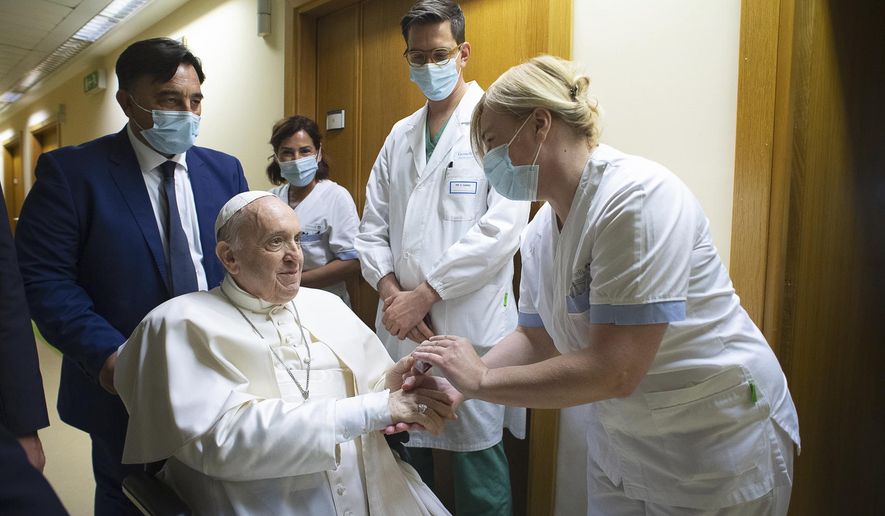The ongoing hospitalization of Pope Francis, the 84-year-old leader of the world’s 1.2 billion Roman Catholics, may be “the moment that marked the beginning of the end of his papacy,” a Jesuit colleague said in a published opinion column.
Writing for Religion News Service, the Rev. Thomas J. Reese said that “even with the best prognosis, age is catching up to Francis. Barring a miracle, he will only be expected to continue as pope for five or six years.”
Francis, the first member of the Society of Jesus to serve as pontiff, has previously said he would not consider retirement, as his then-ailing predecessor Pope Benedict XVI did in 2013. That move paved the way for the Argentine-born Francis to take office.
The pope was hospitalized in Rome on July 4, undergoing surgery for diverticular stenosis in which, reportedly, half his colon was removed.
The procedure was Francis’ first hospitalization since being elected supreme pontiff. Earlier in his life, the pope had a portion of one lung removed due to an infection. He also suffers from sciatica, which causes him to walk with a limp.
Though slated to spend only five subsequent days in the hospital, Tuesday marked Francis’ ninth day at Rome’s Gemelli Polyclinic.
Matteo Bruni, head of the Holy See’s Press Office, issued a statement saying Francis “is continuing his planned treatment and rehabilitation” in preparation for his return to the Vatican “as soon as possible,” although an exact date for his release has not been revealed.
Francis is slated to visit Slovakia and Hungary in September. On Monday, the Catholic Bishops’ Conference of Scotland stated they looked forward to “the prospect of a meeting” when the pope attends the November 2021 United Nations Climate Change Conference, known as COP26, in Glasgow.
But the stark assessment by Father Reese, who previously was editor-in-chief of the Jesuit magazine “America” and a columnist for the National Catholic Reporter, is a rare admission from such a prominent U.S. Jesuit.
Earlier, Vatican-watcher Luis Badilla, editor of Il Sismografo had claimed the pontiff’s condition is “severe and degenerative.”
“The adult and mature [Roman Catholic] faithful understand, albeit with pain, that Pope Francis will live the life that God will give him with many physical and physiological as well as metabolic limitations,” Mr. Badilla wrote at the time.
The former Vatican Radio correspondent added Francis “will have to be followed continuously with important clinical checks and other hospitalizations … All the rhetoric about a [papal] ‘superman’ damages his image and his charisma.”
It’s long been known that the Vatican, and those close to the Catholic epicenter, have often obscured the actual condition of an ailing pontiff. The New York Times last week quoted journalist Iacopo Scaramuzzi as saying that “in the Vatican there is a joke that the pope is always well until he dies, and even a bit after that.”
Father Reese’s Religion News Service column assessed Francis’ pontificate thus far and had the flavor of a tribute that bordered on the funereal. It also openly speculated about the qualities needed in the next pope.
“Francis has rebranded the papacy for the 21st century with a pastoral, prophetic and inclusive voice,” Father Reese wrote.
In his 750-word summary, the Jesuit observer noted Francis’ work in capturing world attention “with his compassion and openness to all people.”
At the same time, Father Reese noted the pope was less able to bring “the clerical establishment” around to his way of thinking. But instead of firing objectors, the pontiff has waited for retirements to clear the decks.
Father Reese concluded, “If his papacy is reckoned a failure, it will be because Francis failed to replace or outlast the clerical establishment put in place by John Paul and Benedict. His papacy will only succeed if he is followed by popes who are in sync with his approach to Catholicism, and this is not guaranteed.”
• Mark A. Kellner can be reached at mkellner@washingtontimes.com.




Please read our comment policy before commenting.